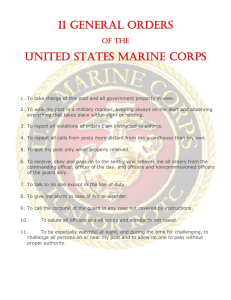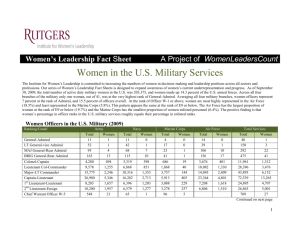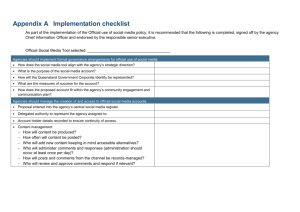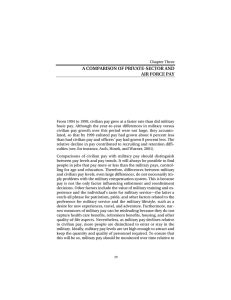Military Careers - Trimble County Schools
advertisement
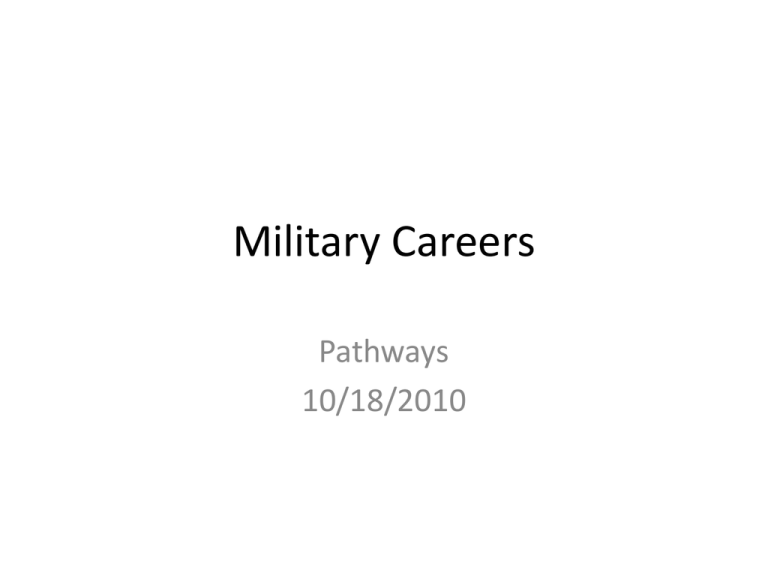
Military Careers Pathways 10/18/2010 The Military • Structure of the US Military – Current Structure Established 1947 – Everything Military falls under the Department of Defense, which is part of the Presidents Cabinet – Department of Defense is under the control of the Secretary of defense (Robert Gates) • He answers directly to the President (Obama) The Military • 3 Military Departments- Headed by Service Secretaries – Army – Air Force – Navy • The marines falls under the Navy Military • Military leaders of the Branches – Army• 4 star general (aka Army chief of Staff) • General George W. Casey, Jr – Air Force • 4 star General (aka, air force chief of staff) • General Norton Schwartz – Navy • 4 star admiral (aka, Chief of Naval Operations) • Admiral Gary Roughead Military • Military leaders of the Branches – Marines • 4 star general (aka Commandant of the Marine Corps) • General James T. Conway – Coast Guard • • • • • Not in Department of Defense Currently under Department of Homeland Security But in War, all assets go to the Navy Leader is Commandant- 4 star Admiral Admiral Robert J. Papp, Jr Branches • The Army – The oldest – Provides the main ground forces for the US – Cool Stuff • Tanks, helicopters, guns, artillery, nuclear weapons – Size • 76,000 officers • 401,000 enlisted members Army Branches • Air Force- youngest – Originally part of the army, until WWII, when it was recognized that air power was important – Space is part of the Air Force – Cool stuff• Fighter jets, bombers, tanker, helicopters, satellites, controls the nuclear ballistic missiles – Size • 69,000 commissioned officers • 288,000 enlisted members Air Force Branches • Navy – Protect the seas for American Interests – Support the Army and Air Force by providing transportation of equipment and personnel – Cool Stuff • Air craft carriers, fighter bombes, big boats with huge guns, Navy SEALS – Size • 54,000 officers • 324,000 enlisted Navy Branches larger image • Marines – Infantry of the Navy – Take the beaches to provide a path from the sea to the enemy – Cool Stuff • Fast, self-sufficient (fighter jets, helicopters), boats – Smallest of the Forces • 18,000 officers • 153,000 enlisted Marines Branches • Coast Guard – Was part of the Department of Transportation – Now part of Homeland Security – Cool stuff • Law enforcement, boating safety, sea rescue, illegal immigration – Size • 7,000 officers • 29,000 enlisted Types of Ranks • Enlisted– Backbone of the military – Do the primary jobs – Enlisted members become specialists • Trained to do specific tasks Types of Ranks • Different ranks for each branch – Enlisted officers are called non-commissioned – Highest rank • • • • Sergeant Major- Army Master Chief petty Officer- Navy Chief Master Sergeant- Air Force Sergeant Major- Marines Types of Ranks • Requirements to enter the military as Enlisted – High School Diploma • Less than 10% enter with GED – Majority of enlisted have some college – Many have associate or bachelors degrees – Some even have masters or doctorates Types of Ranks • Have to take the Armed Forces Vocational Aptitude Battery (ASVAB) • 2 purposes – Check for mental ability to learn – Placement for military jobs • Form 18/19- High School ASVAB – For high school – 900,000 a year take it Types of Ranks • ASVAB – Qualifying score AFQTArmed Forces Qualification Score • Air Force- 36- can go as low as 31 – 0.5% with GED, but you have to have a 50 • Army- 31- can go as low as 26 – 17% GED • Marines- 32- as low as 25 – Less than 5% with GEDmust have a 50 • Navy- 35 as low as 31 – No GED unless you get a 50 on the ASVAB – No Drugs – 3 letters of reference Jobs for the Enlisted Military – – – – – – – – – Infantry Artillery Air Defense Electronic Warfare Cooks Law Enforcement Intelligence Finance Psychological Operations – – – – – – – – – – Civil Affairs Religious Medical Chemical warfare Transportation Explosives and Ammunition Recruiting Maintenance Supply and Logistics more Warrant Officers • Highly trained specialist • They differ from Commissioned Officers because they stay in their primary job • Highly skilled technicians – Work on the complex battlefield systems like • Outrank all enlisted ranks • College not required Commissioned Officers • These are the leaders • “Top Brass”- they have the most medals • They provide overall management and leadership. • Not like warrant officers they don’t specialize – Except for doctors, lawyers, pilots, etc.) Commissioned Officers • Promotion – Enlisted members stay where they are trained for their entire career, unless they get more training – Officers move around a lot – This allows them a better understanding of the whole picture – They start small, commanding a small group of people, then gradually more and more, until they command an entire battalion Commissioned Officers • Minimum of Bachelor’s degree (4 year college) – Have to get more (masters) to be promoted • Also can attend a military academy – West Point – Naval Academy – Air Force Academy • Take ROTC in college – Reserve Officer Training Corps • Officer Training School Commissioned Officers • 2 lines – Non-Line- Not for combat – Medical officers, chaplains, lawyers • Line Officers – Combat officers • Even though a Non-Line may outrank a Line officer, he still will not have any decision making ability in the combat arena Commissioned Officers • 10 levels – Lieutenant • 2nd, 1st – – – – – Captain Major Lieutenant Colonel Colonel Brigadier General – (Rear Admiral- lower half) • 1 star • Major General (Rear Admiral- top half • 2 stars • Lieutenant General (vice Admiral) • 3 stars • General (Admiral) • 4 stars Pay • Officers – $2,745 up to 16, 132 per month • Warrant – $2,683 up to $7, 603 • Enlisted – 1,447 up to 6, 129 per month Pay • Housing allowances • Overseas allowances • Combat duty allowances Website • http://usmilitary.about.com/cs/generalinfo/a/ military101_3.htm

